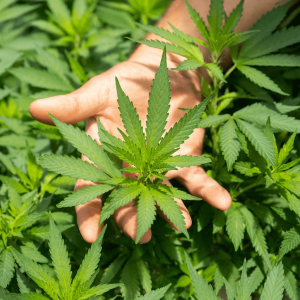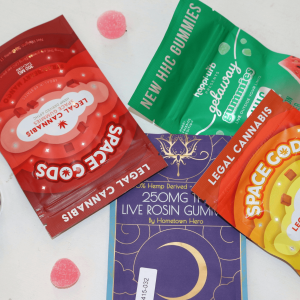If you’re scratching your head wondering what HHC is, don’t worry – you’re not alone. And if you’re wondering whether or not is HHC legal, then you’ve come to the right place!
HHC is among the many hemp-derived cannabinoids, similar to its more famous cousins like THC and CBD, but it’s a bit of a mystery to many. Understanding whether HHC is legal is important because its status can impact its availability and how it can be used safely.
Our aim with this blog is to demystify HHC and give you a clear picture of where the law stands on this compound as well as other hemp-derived products. We’ll break down everything you need to know in an easy-to-understand format, so let’s dive in!

What is HHC?
HHC, or hexahydrocannabinol, is a lesser-known cannabinoid that’s popping up in conversations lately. To put it simply, HHC is a hydrogenated form of THC, meaning it’s Delta 9 THC but with added hydrogen atoms. This small change between these hemp-derived THC isomers’ chemical structure can make a big difference in its effects and stability.
Think of HHC as THC’s rugged cousin – a bit more stable and less prone to degradation when exposed to elements like heat and light. Unlike THC, which has a double bond in its chemical structure, HHC’s hydrogenation process removes this double bond, making it similar in some ways yet distinct from both Delta 9 THC and CBD.
Legal HHC is generally produced through the hydrogenation of THC derived from cannabis. This process, although complex, ensures a structurally stable compound that some find appealing for its unique properties.

The Legal Landscape: An Overview
When it comes to cannabinoids like HHC, the legal environment can be a bit of a patchwork quilt.
General laws about cannabinoids vary widely, with some places being more lenient while others take a stricter stance. One key thing to understand is the difference between federal and state laws.
Federally, the laws set a baseline, but states have the power to tweak or completely overhaul these regulations within their borders. That’s why knowing your local regulations is crucial — what’s perfectly legal in one state might be a big no-no in another.
Federal Law and HHC
At the federal level, the primary piece of legislation is the Controlled Substances Act (CSA), which regulates many substances, including some cannabinoids and hemp derivatives. The Drug Enforcement Administration (DEA) has been somewhat ambiguous about where HHC stands, but the CSA does not explicitly list HHC as a controlled substance.
Then there’s the Farm Bill, which made hemp-derived compounds legal as long as they contain less than 0.3% THC. Since HHC can be derived from hemp, this bill becomes a significant factor in its legal status. However, the lack of definitive federal guidance leaves a lot of room for interpretation and variation at the state level.
State-by-State Analysis
The state-by-state legal landscape for hemp-derived HHC products is a mixed bag. Some states like Colorado and California have made it explicitly legal, embracing the compound along with other cannabinoids.
On the flip side, states like Idaho and Montana have drawn a clear line in the sand, making HHC explicitly illegal.
Then there are states with ambiguous or unclear laws, where HHC exists in a grey area. In these states, whether or not HHC is considered legal often comes down to interpretations of existing laws or pending legislation.
If you’re considering using or selling HHC, it’s essential to keep up-to-date with your state’s laws and any upcoming legislative changes.
HHC and the FDA
When it comes to the Food and Drug Administration (FDA) and cannabinoids like HHC, things can get a bit complex.
The FDA has strict regulations on cannabinoids, particularly when it comes to their inclusion in food and dietary supplements. As of now, the FDA has not approved HHC for use in these products, and it closely monitors any goods containing the compound.
Recent FDA warnings emphasize that, much like other cannabinoids, HHC must not be marketed as having medical benefits unless backed by rigorous scientific research. The agency continually updates its guidelines, so it’s vital to stay informed if you’re looking to incorporate HHC into your products.
Legal Risks and Compliance
Navigating the legal landscape of HHC can be tricky for both consumers and producers. For consumers, purchasing or using HHC in states where it is not explicitly legal can result in penalties, fines, or even criminal charges.
Producers and sellers face an even greater risk, as distributing HHC in states with restrictive laws could lead to significant legal repercussions, including the potential for business shutdowns or hefty fines.
To stay compliant, it’s crucial to thoroughly research and understand both federal and state laws regarding HHC products. Regularly checking for updates and consulting legal experts can help ensure that you’re adhering to current regulations and avoiding legal pitfalls.

HHC in International Markets
When it comes to the global stage, the legal status of HHC is just as varied as it is in the United States, if not more so.
Different countries have distinctive approaches to legal hemp-derived cannabinoids, and HHC is no exception. In some nations, like Canada and parts of Europe, regulations surrounding cannabinoids allow for the use of HHC under certain conditions, often aligning it with existing rules for THC and CBD. However, many countries in Asia and Africa maintain stringent restrictions, categorically banning HHC and similar substances.
Import and export regulations can be especially tricky, as navigating customs laws requires a clear understanding of both the sending and receiving countries’ legal frameworks.
Compared to other cannabinoids like CBD, which has seen more widespread acceptance internationally, HHC is still navigating murky waters. Staying on top of international laws and seeking professional legal advice is essential for any business looking to enter the global market with HHC products.
Industry Responses
How the cannabis industry is reacting to HHC is quite fascinating. Major cannabis companies are starting to take notice, and many have issued statements recognizing the compound’s potential.
With HHC offering a unique angle in a crowded market, some brands are incorporating it into their product lines to stand out.
Alongside traditional products like oils and tinctures, HHC-specific offerings such as gummies and vape cartridges are making their way to shelves, showcasing the industry’s innovative spirit.
Consumer Perspective
For those diving into the world of HHC, understanding product labels and lab results is crucial. Labels should clearly indicate the HHC content, sources, and any other cannabinoids present. Lab results, often accessible via a QR code on the packaging, provide a detailed breakdown of these components and verify the product’s safety and legality.
When buying HHC products legally, it’s wise to purchase from reputable sources that provide third-party lab testing results.
Knowing your consumer rights and protections is equally important; be aware of return policies, and ensure that the products comply with local regulations to avoid any legal issues.
The Future of HHC’s Legal Status
Predicting the future legal status of HHC involves looking at current trends and potential legislative changes on the horizon. With the growing interest in cannabinoids, it’s likely that more states will move towards formalizing their stance on HHC, either by legalizing it under specific regulations or by prohibiting it explicitly.
Federal legislation may eventually address HHC more directly, providing clearer guidelines and potentially superseding state laws. Advocacy groups play a crucial role in this process, pushing for research and legislation that supports the responsible use and regulation of cannabinoids like HHC.
By organizing awareness campaigns and engaging with lawmakers, advocates can help shape a legal framework that balances public safety with access to beneficial compounds.

Conclusion
In summary, the legal landscape for HHC is complex and constantly evolving. From federal acts like the CSA and Farm Bill to varying state laws, understanding the legal status of HHC requires continual attention. The industry’s response and the global perspective add additional layers to consider.
As we look to the future, staying informed about upcoming legislative changes and the influence of advocacy efforts will be key. Whether you’re a consumer or a producer, keeping up with the latest legal developments will help you navigate this intricate terrain.
Stay proactive, consult legal experts, and always ensure compliance to protect yourself and your business.
Is HHC Legal? Frequently Asked Questions
1. What states is HHC illegal in?
The legality of HHC varies from state to state, and it’s essential to check the specific laws of your state before purchasing or using HHC. Some states have explicitly banned HHC, often aligning their regulations with those for synthetic cannabinoids. Others may not have clear rules yet, so always stay updated with the latest legal information surrounding the cannabis plant.
2. Is HHC being banned?
While HHC is not banned at the federal level in the United States, it faces scrutiny and potential bans in various states. The legal landscape is rapidly evolving, and certain jurisdictions might move to restrict or ban HHC to ensure public safety or align with federal regulatory guidance. Keep an eye on legislative updates to stay informed.
3. Is it OK to smoke HHC?
Smoking HHC is generally considered safe if you purchase it from reputable sources that provide third-party lab testing to ensure purity and quality. However, like with any substance, moderation is key, and it’s important to be aware of potential health risks associated with smoking. Always consult with a healthcare professional if you have concerns.
4. Is HHC stronger than CBD?
HHC and CBD are different cannabinoids with distinct effects. HHC is considered to have psychoactive properties, which means it can alter perception and mood, potentially making it feel stronger than CBD, which is non-psychoactive and typically used for its soothing and calming effects. The potency of the experience will depend on individual reactions and the specific product used.

 Rewards
Rewards





